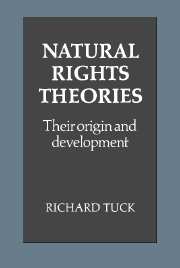Summary
Although, as we have seen, Grotius's achievement was a remarkable one, and his theory provided a formidable and exciting ideology for his mid-seventeenth-century audience, it was nevertheless incomplete in a number of important respects. In particular, it stressed individuality in the area of rights, but communality in the area of obligation, and though that might be logically coherent there was a certain psychological implausibility in it. Grotius's men were fiercely defensive of their original rights, and capable of so far controlling their own lives that they could commit themselves to slavery; and yet their moral world was informed by the principle of sociability with its distributive and unindividualistic implications, and in extremis their more harmful commitments could be disregarded. We have seen that Grotius reconciled these two sides of his theory with the claim that sociability necessitates respect for individual rights, but the psychology required to make this work was unconvincing. The history of natural rights theories during the next fifty years is indeed a story of argument over precisely this issue: does a natural rights theory require a strongly individualistic psychology and ethical theory? The most famous figure to answer this question in the affirmative was of course Hobbes, but the first person to do so was John Selden, and his contribution to the development of natural rights theories needs to receive more attention than it has hitherto enjoyed.
- Type
- Chapter
- Information
- Natural Rights TheoriesTheir Origin and Development, pp. 82 - 100Publisher: Cambridge University PressPrint publication year: 1979
- 3
- Cited by



